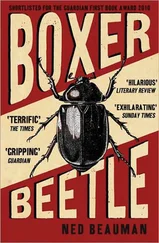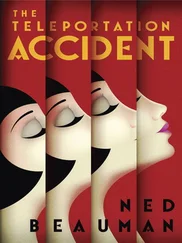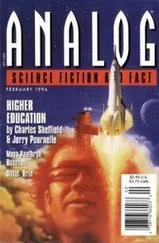‘Well — Martin, isn’t it?’
‘Yes.’
‘Martin, you don’t have to talk to us,’ says Fourpetal. ‘We can just leave. And then you can decide whether or not to call your boss and tell him we were here, and I expect you probably won’t, since a meeting like this is hard to explain even if it’s no fault of your own, but either way we will be gone long before one of your white vans has time to come here and gulp us down. That can happen. But considering I saved your life once, I think a reasonable code of ethics might say that you’re under some obligation to help us with the answers to a few innocuous questions.’
‘What do you mean, saved my life?’
‘That night at the brothel in Holborn. When that bouncer pulled a knife on you because of what you made that Latvian girl do. No, Martin, I’m not saying he would have murdered you for certain, but I know you would have ended up in hospital with a lot of perforations and explaining to do if I hadn’t talked him down.’ Martin’s mouth just hangs open. ‘Bloody hell, you’re not telling me you don’t even remember?’ Fourpetal continues. ‘Were you really that pickled?’ Raf has to stop himself from smiling: Fourpetal is a prick but he’s really good at this. In McDonald’s on Monday he didn’t seem nearly so confident, and perhaps the difference here is that he finds something nourishing in Martin’s obvious discomfort.
‘I. . don’t remember any of that.’
‘Well, that might be for the best, actually. But, Martin, the main thing is, you have a chance to return the favour now. Just help us understand what we’ve got ourselves into.’
‘If they found out I’ve told you anything. .’
‘They won’t. How would they?’
Martin sighs and then walks over to a row of wooden bleachers. Raf and Fourpetal sit down beside him. ‘I honestly don’t even know that much,’ he says.
‘Fine. But maybe you can start by telling us why you’re involved in all this. Aren’t you a lithium man? There’s no lithium in Burma.’
‘There is, actually,’ Martin says. ‘A bit. But this isn’t about that.’ He didn’t realise it at the time, he explains, but his career in the lithium sector came to an end one day in January about twenty-five thousand feet above the southern hallux of the Hindu Kush. Martin was on his laptop but all three of the bodyguards were at the Cessna’s windows watching the dawn enfire the snow like paraffin sluicing through the valleys. In a little while they would cross the border from Afghanistan into Pakistan and by seven o’clock local time they were supposed to have landed in Quetta, where Martin was going to make a last, urgent, probably hopeless attempt to convince officials from the Balochistan provincial government that the exploration licence for lithium deposits north of the city should go to Lacebark instead of a newly established Kernon Whitmire subsidiary called Adosh Mining Corporation.
He hadn’t slept or eaten since they stopped in Odessa to refuel, so by now he was hungry and bored and could already feel against his eyeballs the first crinkly touch of the hundred-metre roll of cling film that jet lag was going to wrap around his head today. All his life he’d carried an alarm clock in his belly like the crocodile in Peter Pan — boring about bedtimes, incapable of staying up late, clicking awake at six every day even back when he was at Oxford — but like an idiot he’d let himself take a job that obliged him to fly thousands of miles a year, and he was convinced it was wearing out his heart. In London it would only be coming up to two in the morning. Supposedly his jet lag would get even worse if he thought about that too much. But it was impossible to keep London out of his mind. Back at City Airport, when the plane was already gaining speed on the runway, he had got a call from his wife about his stepson.
‘You have to come home,’ she’d said, damp-voiced.
‘What’s wrong?’
‘Dylan’s at the police station.’
At first Martin charitably assumed that the sixteen-year-old had been in a bicycle accident or something. ‘Is he hurt?’
‘No, no, they came to the house and took him away.’
‘Jesus, why?’
‘It’s so awful! Where are you?’
He felt the Cessna lift into the air. ‘On the plane. I’m going to lose you in a second.’
‘. . have to. . home!’ Already the signal was dropping as they soared out of reception range.
‘Darling, I’m sure it’s all a mistake — I’ll talk to you when I land!’
Actually, Martin wasn’t sure it was all a mistake. For a while now, in fact, he’d been firmly expecting to find out one way or another that Dylan was up to something criminal. Almost every day of the recent school holidays he had got up at six to see light still creeping out from under the door of the boy’s bedroom. That light always made him uneasy. Sometimes he wanted to knock but he knew it would start an argument. He paid the mortgage on this house every month and yet here inside it was this shady separatist zone where he couldn’t set foot, like one of the semi-autonomous Third World slums that were too dangerous even for the riot squads; his own fault for falling in love with a woman who was already a divorced mother by the time she was twenty-seven. Most likely, he decided, Dylan was involved somehow in selling drugs. He’d read in the paper recently about new pills coming in from China. When they landed in Odessa he couldn’t get a GSM connection, so by the time they were over Afghanistan he was desperate to get back on the ground and have a chance to talk to his wife again.
But then one of the pilots, a Frenchman, came out from the cockpit. ‘We’re changing course.’
‘Is there a problem?’
‘Instructions from London.’ Martin’s employer, unlike his wife, had the privilege of contacting the plane in flight.
‘Where are we going?’
‘Sukkur.’
‘Where’s that?’
‘About four hundred kilometres south-east of Quetta.’
‘But my meeting with the MMD is at lunchtime.’ And Lacebark were spending a ludicrous amount of money to haul his mouth to that meeting. There wouldn’t be another chance: strictly speaking the committee was supposed to have concluded its deliberations the previous day.
The pilot shrugged. ‘They say they’ll call you to explain as soon as you have reception on the ground.’
‘Don’t we have a flight plan we have to keep to?’
‘They’ll pay someone off.’
They descended towards Sukkur’s single short runway over bland fields of cotton and rice and jute. On their right was the Indus, which new Indian dams and a cold winter had shrunk down inside its grey banks like a consumptive in a baggy old suit. As the Cessna’s wheels hit the tarmac, Martin turned his phone back on, waited for it to negotiate a connection to a Pakistani provider called Telenor, and called his boss in London. He didn’t want to speak to his wife until he could tell her for certain how soon he’d be back.
‘Can you please tell me what I’m doing here?’
‘Harenberg needs someone in Khairpur right away and no one could get a flight in time. Luckily you were already in the air.’
‘What about the MMD?’
‘We weren’t going to get that licence anyway. And Harenberg is saying this is bigger than your MMD meeting.’
‘What does he mean?’
‘There’s a five-seater van and a driver waiting for you at the terminal. You need to get to the police station on Faujdari Road in Khairpur — it’s about twenty miles south of Sukkur. They’re expecting you. There’s a guy in a holding cell there. They’re going to release him into your custody. Lock him in the back of the van and don’t let him out of your sight until Bezant can get there.’
Читать дальше












